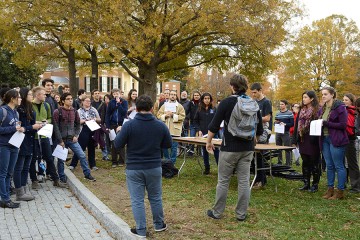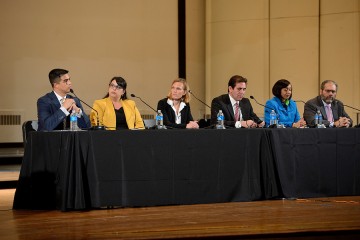Johns Hopkins University President Ronald J. Daniels and Provost Sunil Kumar circulated a message to the university community Monday on concerns related to potential changes in U.S. immigration laws and regulations, emphasizing the university's belief that dismantling protections for undocumented students would "affect our country's vitality in significant ways."
While it is unclear what policies the President-elect Donald Trump will put in place one he takes office, the issue of immigration was a cornerstone of his campaign, which included promises to deport all undocumented immigrants and to build a wall along the U.S.-Mexico border. Trump also said during the campaign that he plans to repeal all executive orders put in place by President Barack Obama, which include the Deferred Action for Childhood Arrivals program, or DACA. DACA, enacted in 2012, makes certain undocumented immigrants—so-called Dreamers, who entered the U.S. before turning 16 and before June 2007—exempt from deportation.
A group of Johns Hopkins students has circulated a petition asking JHU's administration to "take concrete steps to protect its affiliates from mass deportation by becoming a 'sanctuary school' and refusing to allow [Immigration and Customs Enforcement] officers from entering its campuses." Similar efforts are under way at colleges and universities across the country.
Last month, Daniels joined more than 500 college and university presidents from public and private institutions across the U.S. in signing a statement in support of DACA and undocumented immigrant students.
The full text of the message sent by Daniels and Kumar to the JHU community is below:
Dear Students, Faculty, and Staff:
Over the past month, members of our community have expressed understandable concern about potential changes in national policies as a result of the presidential transition, particularly related to undocumented U.S. residents, and have sought clarification of the university's stance.
On Nov. 21, Johns Hopkins joined hundreds of U.S. colleges and universities to call on national leaders to uphold and expand the Deferred Action for Childhood Arrivals, or DACA, program, reaffirming this university's previous public support for the 2010 Dream Act. In arguing for the adoption of the Dream Act, we expressed our belief that the country would benefit from the removal of barriers to participation in higher education by thousands of young students who have grown up in the United States. Time has not dulled that commitment or belief, and we hope that we will be successful in persuading the new administration that dismantling DACA would affect our country's vitality in significant ways.
We will watch closely for any proposed changes to DACA. Should immigration policies shift in ways that adversely affect the financial standing of our students—for example, making them ineligible to work during their studies—we will provide emergency aid or other financial support to ensure they can complete their degrees at Johns Hopkins.
In addition, our long-standing commitment to protect the privacy rights of our students, faculty, and staff means that we would not permit law enforcement or other officials access to private spaces on our campuses to enforce immigration laws absent a valid warrant or court order. Further, the university does not provide information about the immigration status of members of our community unless required by law, and Johns Hopkins' safety and security officers do not request information regarding citizenship, nor enforce federal immigration laws, without a specific court order.
We understand the significant uncertainty that the current debate on the status of Dreamers has created, and will do our best to keep the community apprised of developments in this area. In the meantime, those in need of support or counseling related to this issue should contact Homewood Counseling Center, the Johns Hopkins Student Assistance Program, University Mental Health, or the Faculty and Staff Assistance Program.
Sincerely,
Ronald J. Daniels
PresidentSunil Kumar
Provost and Senior Vice President for Academic Affairs
Posted in University News
Tagged diversity, immigration









